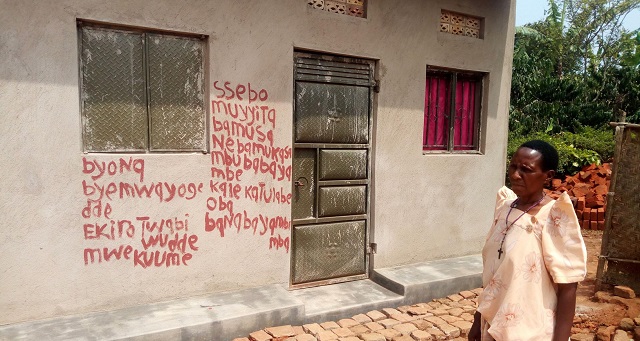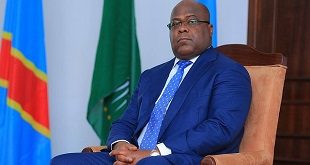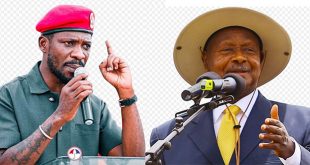
Boots without brains
Fred David Egesa, a security analyst told The Independent on Sept.09 that he thinks the president’s announcement of victory by the president could impact negatively on investigations.
“I don’t know how much they have gathered but sometimes, keeping quiet and limiting information to the public for some time would be the best option.”
“When security agencies do investigations, they always have two minds; they may be right but they may also be wrong with their prima facie evidence,” he said, “But when you see the president coming out with a conclusion, it makes it hard for the investigators.”
Besides the failure by the security agencies to profile criminality based on regions and build an inventory for such, there is also laxity or even a failure to design appropriate mechanisms to respond to outstanding criminal events like the current machete killings, Egesa, told The Independent.
Egesa also thinks that there is an indication of a break-down in the relationship between civilians and the security agencies. He told The Independent that intelligence is supposed to simplify security operations. “It is not enough to carry guns and have boots on the ground,” he said.
According to an advisory on crime from the US Embassy in Kampala for American citizens intending to travel to Uganda, many criminal investigations in Uganda never amount to anything.
“The Uganda Police generally have limited resources to carry out complex investigations, and limited capabilities in areas such as preservation of crime scene evidence and utilization of DNA to assist in prosecutions.”
“The Ugandan police may make an arrest based on a court warrant or on reasonable suspicion that the suspect has committed or is about to commit a crime. The police are responsible for investigating any suspected crimes. If a case is awaiting sufficient evidence, it can remain open indefinitely under “Put Away” status.
What next?
President Museveni’s recent comments have once again led to many wondering what exactly has been behind the Greater Masaka murders. Is it common criminality or terrorism?
When MPs who sit on the Defence and Internal Affairs Committee in Parliament attempted to camp in the sub-region to try to investigate the murders and report back to Parliament, they were met with hostility from the Minister of Security, Jim Muhwezi.
Wakayima Musoke Nsereko, the MP for Nansana Municipality and a member of the committee told The Independent that the legislators were blocked in Lwengo and Bukomansimbi by the security minister.
“We wanted to speak to as many victims as possible as well as interact with the local councils; right from LCI—LCV but we failed.”
Okot Moses Junior Bitek, another MP on the committee who represents Kioga County in Amolatar District told The Independent that their fact-finding mission did not achieve much.
“We were blocked from talking to the local people and for the security officials who we were allowed to talk to, we found that they were coached to say certain things.”
“That is why when one police officer in Bukomansimbi District went off the script, he was apprehended. We didn’t get to the bottom of the cause of the murders in the area.”
Bitek said when they were in Bukomansimbi and the residents had started telling them the issues they have with security agencies, the security minister lost his cool and intervened.
“Our report in Parliament will not go beyond implicating the Minister for Security for blocking our committee to find out what exactly is happening in Masaka,” he said.
But Rosemary Nyakikongoro, the committee chairperson who led the team to Greater Masaka told The Independent that she would not divulge her findings to the media.
“In fact we are yet to harmonise our report and so I cannot tell you anything now. But we are definitely going to present our report on the floor of Parliament on Tuesday (Sept. 14),” she told The Independent on Sept. 09.
For Mukono Municipality MP, Betty Bakireke Nambooze, there is a hidden motive by the government. She said the current killings are “similar to many past atrocities” in which many people have been killed as a way to discredit the opposition.
In the 1990s, for instance, when people in northern Uganda voted overwhelmingly against the NRM government in favour of opposition, reckless killings of civilians was common.
Observers say some of the murders were perpetrated by the government in a bid to implicate some persons in the region as insurgents who wanted to overthrow the government. These days, the north votes NRM and the region has become peaceful.
Some observers have also come out to blame the November, 2016, killings in Kasese to the overwhelming support the people in the Rwenzori sub-region gave to the Forum for Democratic Change in the 2016 general election.
In the just concluded 2021 elections, President Museveni and his NRM government was beaten in the Masaka sub-region with over 90% of voters opting for the opposition novice, Robert Kyagulanyi Ssentamu and his party, the National Unity Platform.
Political analysts have told The Independent that Museveni never took the heavy defeat kindly. They say the Masaka murders could be one of the government’s ways of “crashing” anybody who shows any form of dissent.
Solomon Asiimwe, a lecturer of governance at Uganda Martyrs University and a security expert told The Independent on Sept.09 that assassinations or such killings in Masaka are examples of violent acts that may be used to force political responses.
“What is important is for our security to find the author and motive of this terrorism because terrorism within a state may be intended to achieve a political objective,” he says.
“We have issues to solve. As a country, we have spent so much in strengthening the military forgetting other parts of the security sector like the intelligence services,” he said.
“The threats we are facing apparently require intelligence knowledge and not necessarily the military and it seems our systems were left behind in financing, training and management.”
****
 The Independent Uganda: You get the Truth we Pay the Price
The Independent Uganda: You get the Truth we Pay the Price



Dictator Museveni and his bandits in the military junta are responsible for the killings in Buganda!